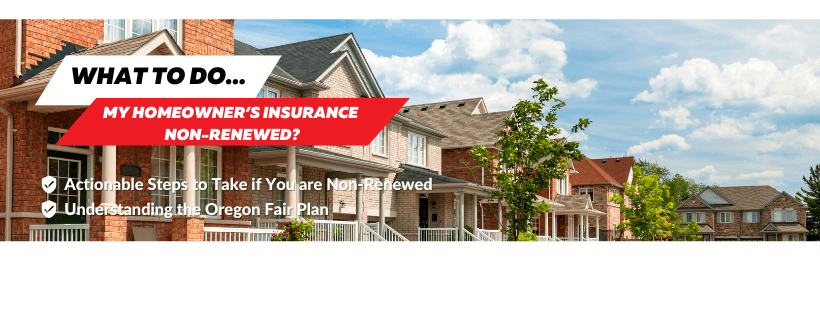What to Do if Your Homeowners Insurance is Non-Renewed: A Comprehensive Guide


Homeowners insurance is a vital safeguard for your most valuable asset—your home. However, receiving a non-renewal notice from your insurance carrier can be unsettling. Non-renewal can occur for various reasons, including changes in your risk profile, the insurer’s underwriting policies, or a shift in market conditions. If you find yourself in this situation, it’s essential to understand your options and take proactive steps to secure new coverage. This guide will walk you through what to do if your homeowners insurance is non-renewed, focusing on current research and insights, with a special look at the Oregon Fair Plan.
Understanding Non-Renewal
First, it’s crucial to differentiate between cancellation and non-renewal. Cancellation usually happens within the first 60 days of your policy term and can occur due to non-payment or significant misrepresentation. Non-renewal, on the other hand, typically happens at the end of your policy term and can be due to a variety of reasons such as:
Increased Risk Profile: Insurers might consider your home riskier to insure due to factors like an increased claim history.
Natural Disasters: The risk of wildfires, hurricanes, and hail can make insuring homes in certain areas less attractive to insurers.
Market Changes: Insurers might alter their underwriting guidelines or pull out of markets experiencing high loss ratios.
Recent Trends and Major Losses
In recent years, states like California, Oregon, Texas, Louisiana, and Florida have experienced significant losses due to natural disasters. Wildfires in California and Oregon, hurricanes in Texas, Louisiana, and Florida, and hailstorms across multiple states have led to billions in insured losses. These events have caused insurers to reassess their risk exposures and, in some cases, non-renew policies to mitigate future losses.
For example:
California: The 2020 wildfire season was one of the most destructive on record, with over 4.2 million acres burned. The resulting claims have led many insurers to reduce their exposure in fire-prone areas.
Oregon: The 2020 wildfires also impacted Oregon, causing significant damage and leading insurers to re-evaluate their risk models.
Texas: Hurricanes like Harvey and recent severe hailstorms have resulted in high claim payouts, prompting insurers to adjust their strategies.
Louisiana: Multiple hurricanes in recent years, including Laura and Ida, have caused extensive damage and increased the frequency of non-renewals.
Florida: The state’s susceptibility to hurricanes means it consistently experiences high insured losses, making it a challenging market for insurers.
Steps to Take if Your Homeowners Insurance is Non-Renewed
Understand the Reason: The first step is to understand why your policy is being non-renewed. Insurers are required to provide a reason, and knowing this will help you address any issues that might make finding new coverage difficult.
Contact Your Insurance Agent: Your insurance agent can provide valuable insights and guidance on the next steps. They can help you explore alternative insurance options and understand the specifics of your non-renewal.
Shop Around for New Coverage: Don’t panic. Many insurers operate in the market, and you might find a company willing to cover your home. Compare quotes from multiple insurers to find the best coverage and price.
Consider the Oregon Fair Plan: If you’re unable to find coverage through traditional insurers, the Oregon Fair Plan Association (OFPA) offers a safety net. The OFPA provides basic property insurance for those unable to secure it in the standard market due to high-risk factors. This plan is especially beneficial for homeowners in areas prone to natural disasters.
Improve Your Risk Profile: Take steps to mitigate risks associated with your property. For instance, if wildfires are a concern, create defensible space around your home by clearing brush and using fire-resistant materials. Installing a home security system or upgrading your roof can also make your property more attractive to insurers.
Stay Informed: Keep up with local and national insurance trends. Understanding the broader market dynamics can help you anticipate changes and prepare accordingly.
Oregon Fair Plan: A Closer Look
The Oregon Fair Plan Association was established to provide basic property insurance for homeowners who cannot obtain it through traditional insurers. The plan offers coverage for fire, vandalism, and other perils but typically excludes general liability, personal property, earthquake and flood coverage (earthquake and flood are never covered in a classic homeowners insurance policy), which can be purchased separately.
To qualify for the Oregon Fair Plan, you must demonstrate that you have been unable to secure insurance through the standard market. This plan is particularly useful for those in high-risk areas where insurers are reluctant to provide coverage.
In addition, to the Oregon Fair Plan you will also need to purchase a Difference in Condition or DIC insurance plan that will take your basic fire property coverage offered by the Oregon Fair Plan and make it into a basic homeowners insurance policy. This mean you need to purchase two separate expensive plans to make similar coverage to a conventional homeowners insurance policy. The Oregon Fair Plan is the plan of last resort and should only be used if you have no other options. Keep in mind if you have a mortgage the Oregon Fair Plan policy alone will not satisfy your mortgage requirements and the bank may call your note in full if insurance coverage can not be placed! Are you mad? Great contact the Oregon Insurance Commissioner and ask for better coverage options for homeowners all over the state of Oregon.
Conclusion
Receiving a non-renewal notice for your homeowners insurance can be daunting, but it’s not the end of the road. By understanding your options and taking proactive steps, you can secure the coverage you need to protect your home. Remember, it’s essential to stay informed, improve your risk profile, and explore all available options, including the Oregon Fair Plan.
At Bancorp Insurance, we help homeowners navigate these challenges. Contact us today at 800-452-6826 or book an appointment online at www.bancorpinsurance.com for a comprehensive review of your current home insurance coverages. Let us help you find the best solutions to safeguard your home and peace of mind.
We’re Here to Help you Find the Right Coverage!
Request an appointment online, in-person, or telephone to discuss your needs.
Bancorp’s insurance agents are available to provide you with a free review and consultation. Contact Us – Bancorp Insurance Call 800-452-6826



